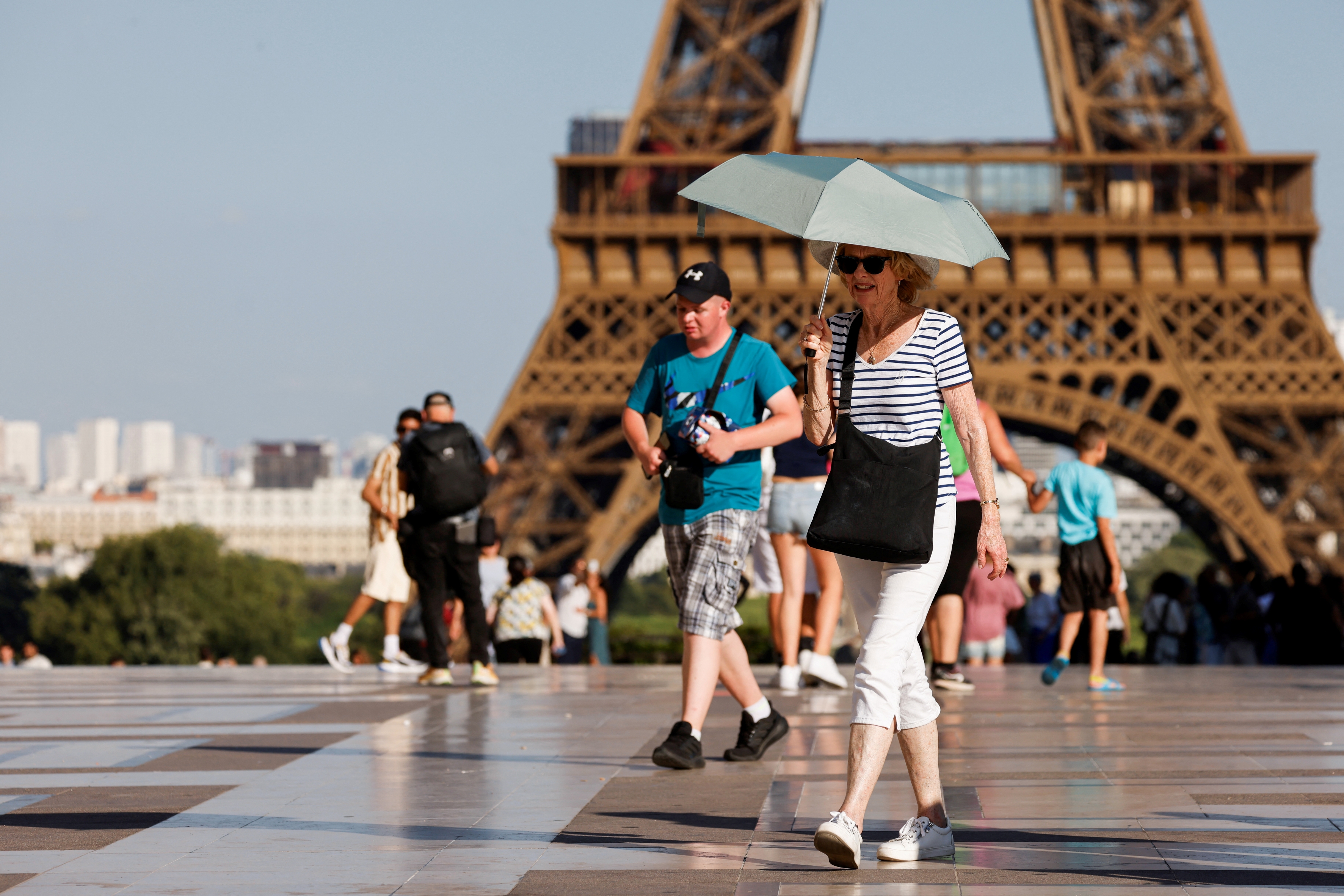Heat Wave in Europe: What Every Traveler Needs to Know
Record-breaking summer temperatures, wildfires, and travel disruptions — they’re reshaping summer 2025 trips. Here’s how to stay safe, prepared and savvy.

Profit and prosper with the best of Kiplinger's advice on investing, taxes, retirement, personal finance and much more. Delivered daily. Enter your email in the box and click Sign Me Up.
You are now subscribed
Your newsletter sign-up was successful
Want to add more newsletters?

Delivered daily
Kiplinger Today
Profit and prosper with the best of Kiplinger's advice on investing, taxes, retirement, personal finance and much more delivered daily. Smart money moves start here.

Sent five days a week
Kiplinger A Step Ahead
Get practical help to make better financial decisions in your everyday life, from spending to savings on top deals.

Delivered daily
Kiplinger Closing Bell
Get today's biggest financial and investing headlines delivered to your inbox every day the U.S. stock market is open.

Sent twice a week
Kiplinger Adviser Intel
Financial pros across the country share best practices and fresh tactics to preserve and grow your wealth.

Delivered weekly
Kiplinger Tax Tips
Trim your federal and state tax bills with practical tax-planning and tax-cutting strategies.

Sent twice a week
Kiplinger Retirement Tips
Your twice-a-week guide to planning and enjoying a financially secure and richly rewarding retirement

Sent bimonthly.
Kiplinger Adviser Angle
Insights for advisers, wealth managers and other financial professionals.

Sent twice a week
Kiplinger Investing Weekly
Your twice-a-week roundup of promising stocks, funds, companies and industries you should consider, ones you should avoid, and why.

Sent weekly for six weeks
Kiplinger Invest for Retirement
Your step-by-step six-part series on how to invest for retirement, from devising a successful strategy to exactly which investments to choose.
Traveling in the summer can be a great way to take advantage of warm weather, but if you're planning a trip to Europe, temperatures might be too warm for your liking. Europe is facing record-breaking heat, making summer travel safety even more important.
The World Meteorological Organization reports that Western Europe is affected by a strong high-pressure system that’s trapping dry air from northern Africa, leading to above-average temperatures in Western Europe, Central Asia and North Africa.
As you get ready for your Italian dream trip or other European adventure, review these tips for Europe heatwave travel to keep yourself safe and have an enjoyable vacation.
From just $107.88 $24.99 for Kiplinger Personal Finance
Become a smarter, better informed investor. Subscribe from just $107.88 $24.99, plus get up to 4 Special Issues

Sign up for Kiplinger’s Free Newsletters
Profit and prosper with the best of expert advice on investing, taxes, retirement, personal finance and more - straight to your e-mail.
Profit and prosper with the best of expert advice - straight to your e-mail.
How the heatwave is affecting Europe

Popular destinations including France, Spain, Portugal, Italy and Greece are facing extreme heat, prompting countries to issue heat alerts. In early July, France experienced temperatures above 40 degrees Celsius (104 degrees Fahrenheit), while temperatures in Morocco reached above 45 degrees Celsius (113 degrees Fahrenheit). Wildfires have broken out in Crete, a popular tourist spot in Greece, forcing evacuations.
The heatwave is having widespread effects across Europe. In early July, the Eiffel Tower’s summit was closed because of the heat. Italy experienced a blackout because of a surge in electricity use to power cooling devices like air conditioners.
Tragically, from June 23 to July 2, approximately 2,300 people died of heat-related causes across 12 European cities. Those deaths are a sober reminder of how dangerous extreme heat can be, and how important it is to travel safely this summer.
Going abroad? Pack the right card. Compare Kiplinger top picks for international travel cards at a glance. Earn miles, skip fees and enjoy global perks, powered by Bankrate. Advertising disclosure.
Summer travel safety tips for European vacations
Planning ahead and carefully structuring your trip can help keep you and your family safe. As you plan your trip, consider these helpful heatwave tips:
Check government resources
Check government guidance before you travel. Many European government websites are posting updated information about heat, closures and local cooling resources available. Familiarize yourself with these websites and check them frequently before and during your trip.
Monitor the weather
Closely watch the weather for all of your travel destinations and be prepared to change your plans based on the forecast. Extreme heat doesn’t just make activities like walking tours uncomfortable, but can even make them dangerous. Plan indoor activities on the hottest days of your trip and adjust your schedule as needed to stay safe.
Verify your lodging is air conditioned
Book lodging at accommodations that have air conditioning. Before you leave for your trip, contact the accommodations to verify that the air conditioning is working.
Bring supplies
Pack supplies that can help you travel safely during the heatwave. A water bottle will make it easier to keep water on hand as you travel. A personal fan can offer relief, too, and a cooling towel that you soak in water and place around your neck can help lower your body temperature.
Learn how to call for medical help
If you have a medical emergency in a foreign country, you’ll need to know how to call for an ambulance. Prepare a list of emergency numbers for each country you’ll be visiting, and keep that list on you while you travel.
Consider travel insurance
European weather, including the wildfires, are affecting popular tourism destinations. Investing in travel insurance can help you get your money back if your trip has to be cancelled or rescheduled because of an issue like a wildfire.

During your trip, these heatwave tips can help keep you safe while you still make the most of your vacation:
Avoid peak heat hours
Schedule your sightseeing so that you avoid peak heat hours, which are usually late in the afternoon from about 3 pm to 6 pm. Try to stay indoors during these times and avoid physically taxing activities.
Call ahead
If you’re planning a trip to a popular destination, call ahead to make sure they’re still open during the heatwave.
Stay hydrated
Drink plenty of water while you travel and avoid beverages that have dehydrating effects, like alcohol and caffeinated drinks. Make yourself drink water even if you don’t feel thirsty.
Dress strategically
Carefully choose your clothes. Light-colored, breathable, lightweight and loose clothes can help keep you cool during your travels. A wide-brimmed breathable hat can also provide some relief from the sun.
Seven Corners offers travel insurance plans with trip protection, emergency medical coverage and around-the-clock travel assistance for both domestic and international adventures.
Be prepared for heat exhaustion and heat stroke
Even if you’re careful during your trip, the extreme temperatures could still lead to heat exhaustion or heat stroke. Being able to quickly recognize these medical issues can help you get the treatment you need, and could even save your life.
According to the American Red Cross, heat exhaustion symptoms include heavy sweating; cold, pale and clammy skin; a fast and weak pulse, nausea, vomiting, muscle cramps and tiredness or weakness. Individuals experiencing heat exhaustion may also be dizzy, have a headache or pass out.
Anyone experiencing heat exhaustion should move to a cool place, loosen any tight clothing and should slowly sip water. You can cool their body with fans, misting, wet cloths or a cool bath. If they vomit, their symptoms get worse or last more than one hour or they become confused, they’ll need immediate medical help.
Heat stroke is a medical emergency and can be deadly. It’s characterized by a body temperature of 104 degrees or higher. Individuals may have a fast, strong pulse, skin that’s hot, red, dry or damp, and a headache or dizziness. Individuals may also become nauseated and confused, and they may pass out.
If an individual experiences heat stroke, you’ll need to call for emergency medical help right away. They should be moved to a cooler place and with fans, misting or wet cloths. They should not be given anything to drink.
Planning for Europe heatwave travel
The current Europe heatwave doesn’t mean that you have to cancel your trip, but you do need to be extra careful in how you plan your summer travel. Climate change means heatwaves are becoming more common, so traveling in extreme heat is likely going to become an ongoing challenge.
With some strategic planning, you can still enjoy your European trip while also staying safe in the heat.
Related content
Profit and prosper with the best of Kiplinger's advice on investing, taxes, retirement, personal finance and much more. Delivered daily. Enter your email in the box and click Sign Me Up.

Paige Cerulli is a freelance journalist and content writer with more than 15 years of experience. She specializes in personal finance, health, and commerce content. Paige majored in English and music performance at Westfield State University and has received numerous awards for her creative nonfiction. Her work has appeared in The U.S. News & World Report, USA Today, GOBankingRates, Top Ten Reviews, TIME Stamped Shopping and more. In her spare time, Paige enjoys horseback riding, photography and playing the flute. Connect with her on LinkedIn.
-
 Nasdaq Leads a Rocky Risk-On Rally: Stock Market Today
Nasdaq Leads a Rocky Risk-On Rally: Stock Market TodayAnother worrying bout of late-session weakness couldn't take down the main equity indexes on Wednesday.
-
 Quiz: Do You Know How to Avoid the "Medigap Trap?"
Quiz: Do You Know How to Avoid the "Medigap Trap?"Quiz Test your basic knowledge of the "Medigap Trap" in our quick quiz.
-
 5 Top Tax-Efficient Mutual Funds for Smarter Investing
5 Top Tax-Efficient Mutual Funds for Smarter InvestingMutual funds are many things, but "tax-friendly" usually isn't one of them. These are the exceptions.
-
 One of the Most Powerful Wealth-Building Moves a Woman Can Make: A Midcareer Pivot
One of the Most Powerful Wealth-Building Moves a Woman Can Make: A Midcareer PivotIf it feels like you can't sustain what you're doing for the next 20 years, it's time for an honest look at what's draining you and what energizes you.
-
 I'm a Wealth Adviser Obsessed With Mahjong: Here Are 8 Ways It Can Teach Us How to Manage Our Money
I'm a Wealth Adviser Obsessed With Mahjong: Here Are 8 Ways It Can Teach Us How to Manage Our MoneyThis increasingly popular Chinese game can teach us not only how to help manage our money but also how important it is to connect with other people.
-
 Looking for a Financial Book That Won't Put Your Young Adult to Sleep? This One Makes 'Cents'
Looking for a Financial Book That Won't Put Your Young Adult to Sleep? This One Makes 'Cents'"Wealth Your Way" by Cosmo DeStefano offers a highly accessible guide for young adults and their parents on building wealth through simple, consistent habits.
-
 My Spouse and I Are Saving Money for a Down Payment on a House. Which Savings Account is the Best Way to Reach Our Goal?
My Spouse and I Are Saving Money for a Down Payment on a House. Which Savings Account is the Best Way to Reach Our Goal?Learn how timing matters when it comes to choosing the right account.
-
 We're 78 and Want to Use Our 2026 RMD to Treat Our Kids and Grandkids to a Vacation. How Should We Approach This?
We're 78 and Want to Use Our 2026 RMD to Treat Our Kids and Grandkids to a Vacation. How Should We Approach This?An extended family vacation can be a fun and bonding experience if planned well. Here are tips from travel experts.
-
 My First $1 Million: Retired From Real Estate, 75, San Francisco
My First $1 Million: Retired From Real Estate, 75, San FranciscoEver wonder how someone who's made a million dollars or more did it? Kiplinger's My First $1 Million series uncovers the answers.
-
 To Love, Honor and Make Financial Decisions as Equal Partners
To Love, Honor and Make Financial Decisions as Equal PartnersEnsuring both partners are engaged in financial decisions isn't just about fairness — it's a risk-management strategy that protects against costly crises.
-
 Top 5 Career Lessons From the 2026 Winter Olympics (So Far)
Top 5 Career Lessons From the 2026 Winter Olympics (So Far)Five lessons to learn from the 2026 Winter Olympics for your career and finances.

